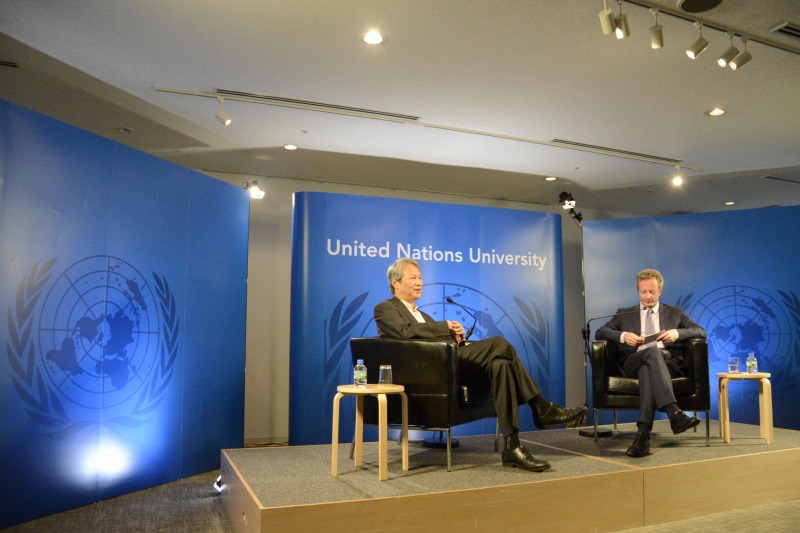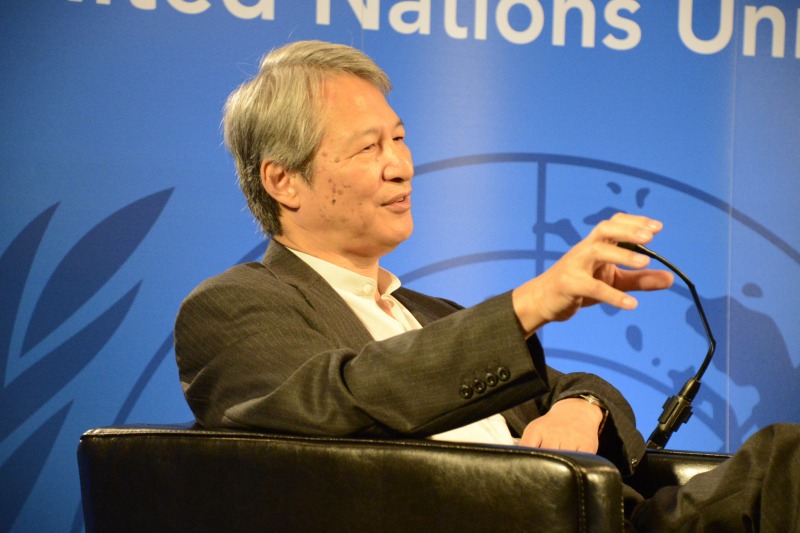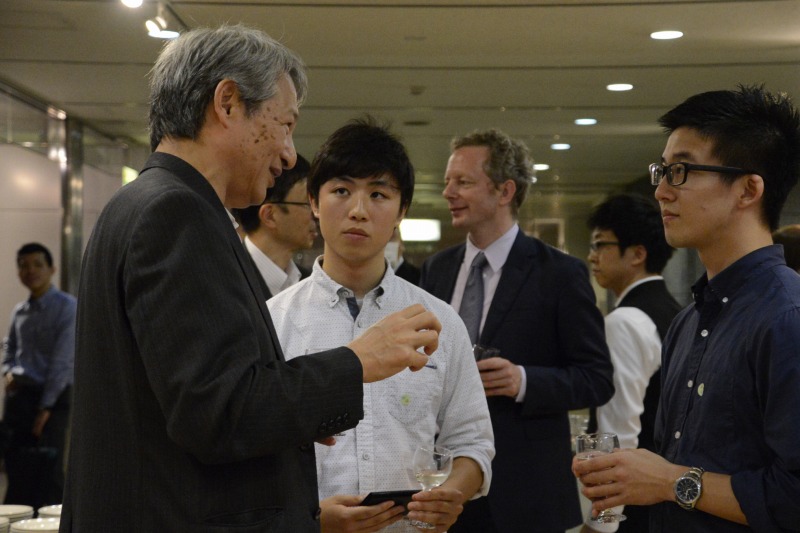News Archives
2016.6.29
“Introducing GRIPS’’, a Dialogue between GRIPS President Takashi Shiraishi and UNU Centre for Policy Research Director Sebastian von Einsiedel.

On June 28 (Tuesday), the Conversation Series by United Nations University (UNU) featured a dialogue between GRIPS President Takashi Shiraishi and UNU Centre for Policy Research Director Sebastian von Einsiedel.
This conversation, entitled “Introducing GRIPS,” focused on the three major visions pursued by GRIPS: 1) Serving as a public policy graduate school that aims to cultivate policy professionals, 2) Training program aiming to educate and enhance networks for mid-career public administrators and senior executives inside and outside of Japan, and 3) Serving a think tank-type role as a global hub for policy studies and education.
The audience included students from the UNU and other universities and persons involved with educational institutions. President Shiraishi was asked at the beginning of the conversation about the major points of difference between GRIPS and other policy schools, to which he replied that most students are mid-career public officials and policy staff with practical experience. He also emphasized that this educational environment promotes interdisciplinary exchange that is not bound by specialized fields. For instance, GRIPS has a diverse range of faculty members. Roughly 30% possess practical policy experience, including economists who publish papers across the world, researchers in scientific and technological fields who conduct joint research with the business world, and political scientists who deal with domestic and foreign themes. These researchers generally utilize different thought processes and languages. President Shiraishi has strengthened deliberate interdisciplinary exchange through measures such as collaborative research so that global faculty members can engage in mutual improvement by learning about and incorporating other fields. This is to cultivate human resources with genuine competitive power where policy is created among faculty members and students.
The other speaker was Mr. von Einsiedel, who mentioned that mutual exchange between the government, think tanks, NGOs, researchers, the private sector, and other parties is less lively in Japan than the United States. He said that GRIPS is a unique Japanese institution for this reason. President Shiraishi stated that such exchange between various groups is one of his achievements during his term of office. He personally researched and taught at the University of Tokyo, Kyoto University, and Cornell University in the U.S. before his appointment to GRIPS vice president in 2005 and to president in 2011. He is also a member of the Cabinet Office’s Council for Science and Technology Policy. He has been active in different worlds as a researcher, educator, government expert, and university president. In his career, he has been a university leader while developing wide-area networks and strong conviction.
In the conversation on financial affairs in university management in recent years, President Shiraishi introduced GRIPS’ Tailor-Made Short-Term Training, a project that is being expanded as one pillar of fiscal reform. He stated that this training is for mainly policy staff including young and middle-ranking public administrators and senior officials in Southeast Asia. Demand is increasing year by year, and 3700 or more people have completed the program up until last year. Most recently, training has been conducted for vice minister-class officials and ministry vice-director-class officials in the Communist Party of Vietnam, as well as continuous training for top officials in Thai local governments. Seventy Thai lieutenant governors have completed the training, of which 20 are currently active as governors.
President Shiraishi’s term of office will end this fiscal year. Regarding the future outlook for GRIPS, he says that its functionality as a think tank will be expanded, and that up until now that a broad range of faculty-level research projects has been conducted to create this foundation. He also stressed that GRIPS is engaging in closer collaboration with the Cabinet Office and government agencies, serving an essential role that provides research and recommendations in the initial policy stage.
The second half of the conversation was a question and answer session with the audience. In response to a question about secret measures for obtaining the human resources needed by the university, President Shiraishi explained that one of his duties is improving GRIPS’ reputation at universities, and that these activities lead to the acquisition of capable faculty members. As for the recruitment of Japanese students, excellent students have been acquired from government agencies and other institutions, but a major challenge for the future is how to facilitate communication between Japanese and international students.
One of the audience members asked for advice about how high school students, who will be responsible for the future of Japan, should choose their future paths. President Shiraishi shared a message he recently gave to 200 high school students at his alma mater in Matsuyama City. President Shiraishi said that students, not their parents, should determine their own futures, just like he did in the past. Like the GRIPS graduates who are active at international organizations and on the global stage, he hopes that students with think of GRIPS as an option that is a turning point for changing or enhancing their careers after gaining a certain amount of career experience.
After the conversation, the audience members and speakers were given the opportunity to interact freely. They enjoyed exchanging views and making connections while drinking beverages.
Article by GRIPS Public Relations
News Archives
2016.6.29
“Introducing GRIPS’’, a Dialogue between GRIPS President Takashi Shiraishi and UNU Centre for Policy Research Director Sebastian von Einsiedel.

On June 28 (Tuesday), the Conversation Series by United Nations University (UNU) featured a dialogue between GRIPS President Takashi Shiraishi and UNU Centre for Policy Research Director Sebastian von Einsiedel.
This conversation, entitled “Introducing GRIPS,” focused on the three major visions pursued by GRIPS: 1) Serving as a public policy graduate school that aims to cultivate policy professionals, 2) Training program aiming to educate and enhance networks for mid-career public administrators and senior executives inside and outside of Japan, and 3) Serving a think tank-type role as a global hub for policy studies and education.
The audience included students from the UNU and other universities and persons involved with educational institutions. President Shiraishi was asked at the beginning of the conversation about the major points of difference between GRIPS and other policy schools, to which he replied that most students are mid-career public officials and policy staff with practical experience. He also emphasized that this educational environment promotes interdisciplinary exchange that is not bound by specialized fields. For instance, GRIPS has a diverse range of faculty members. Roughly 30% possess practical policy experience, including economists who publish papers across the world, researchers in scientific and technological fields who conduct joint research with the business world, and political scientists who deal with domestic and foreign themes. These researchers generally utilize different thought processes and languages. President Shiraishi has strengthened deliberate interdisciplinary exchange through measures such as collaborative research so that global faculty members can engage in mutual improvement by learning about and incorporating other fields. This is to cultivate human resources with genuine competitive power where policy is created among faculty members and students.
The other speaker was Mr. von Einsiedel, who mentioned that mutual exchange between the government, think tanks, NGOs, researchers, the private sector, and other parties is less lively in Japan than the United States. He said that GRIPS is a unique Japanese institution for this reason. President Shiraishi stated that such exchange between various groups is one of his achievements during his term of office. He personally researched and taught at the University of Tokyo, Kyoto University, and Cornell University in the U.S. before his appointment to GRIPS vice president in 2005 and to president in 2011. He is also a member of the Cabinet Office’s Council for Science and Technology Policy. He has been active in different worlds as a researcher, educator, government expert, and university president. In his career, he has been a university leader while developing wide-area networks and strong conviction.
In the conversation on financial affairs in university management in recent years, President Shiraishi introduced GRIPS’ Tailor-Made Short-Term Training, a project that is being expanded as one pillar of fiscal reform. He stated that this training is for mainly policy staff including young and middle-ranking public administrators and senior officials in Southeast Asia. Demand is increasing year by year, and 3700 or more people have completed the program up until last year. Most recently, training has been conducted for vice minister-class officials and ministry vice-director-class officials in the Communist Party of Vietnam, as well as continuous training for top officials in Thai local governments. Seventy Thai lieutenant governors have completed the training, of which 20 are currently active as governors.
President Shiraishi’s term of office will end this fiscal year. Regarding the future outlook for GRIPS, he says that its functionality as a think tank will be expanded, and that up until now that a broad range of faculty-level research projects has been conducted to create this foundation. He also stressed that GRIPS is engaging in closer collaboration with the Cabinet Office and government agencies, serving an essential role that provides research and recommendations in the initial policy stage.
The second half of the conversation was a question and answer session with the audience. In response to a question about secret measures for obtaining the human resources needed by the university, President Shiraishi explained that one of his duties is improving GRIPS’ reputation at universities, and that these activities lead to the acquisition of capable faculty members. As for the recruitment of Japanese students, excellent students have been acquired from government agencies and other institutions, but a major challenge for the future is how to facilitate communication between Japanese and international students.
One of the audience members asked for advice about how high school students, who will be responsible for the future of Japan, should choose their future paths. President Shiraishi shared a message he recently gave to 200 high school students at his alma mater in Matsuyama City. President Shiraishi said that students, not their parents, should determine their own futures, just like he did in the past. Like the GRIPS graduates who are active at international organizations and on the global stage, he hopes that students with think of GRIPS as an option that is a turning point for changing or enhancing their careers after gaining a certain amount of career experience.
After the conversation, the audience members and speakers were given the opportunity to interact freely. They enjoyed exchanging views and making connections while drinking beverages.
Article by GRIPS Public Relations







